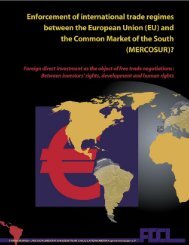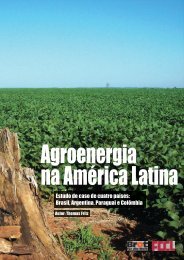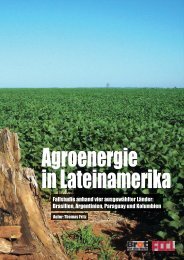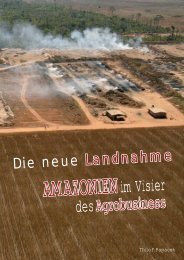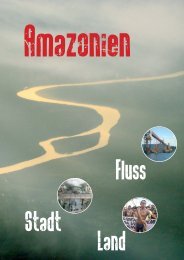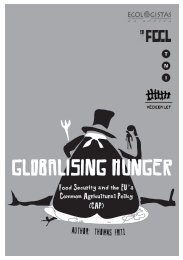(EU) and the Common Market of the South (MERCOSUR)? - FDCL
(EU) and the Common Market of the South (MERCOSUR)? - FDCL
(EU) and the Common Market of the South (MERCOSUR)? - FDCL
You also want an ePaper? Increase the reach of your titles
YUMPU automatically turns print PDFs into web optimized ePapers that Google loves.
Open discussions might, generally speaking, facilitate a more efficient communication,<br />
but it can be legitimately doubted whe<strong>the</strong>r an invitation to participate in an<br />
open minded discussion in <strong>the</strong> area <strong>of</strong> tough, intense negotiations on international<br />
trade regimes can be seen as a serious attempt to let <strong>the</strong> discussions be guided by<br />
<strong>the</strong> ‘unforced force <strong>of</strong> <strong>the</strong> better argument’ <strong>and</strong> to let this direction have an effect on<br />
<strong>the</strong> final outcomes. The European Commission makes it immediately clear in <strong>the</strong> following<br />
paragraph, that it would like to see <strong>the</strong> Brazilian drinking water sector, as well<br />
as <strong>the</strong> wastewater management sector subjected to <strong>the</strong> principles <strong>of</strong> free market<br />
access <strong>and</strong> National Treatment:<br />
“A.WATER FOR HUMAN USE & WASTEWATER MANAGMENT<br />
Water collection, purification <strong>and</strong> distribution services through<br />
mains, except steam <strong>and</strong> hot water<br />
This sub-sector only concerns <strong>the</strong> distribution <strong>of</strong> water through<br />
mains’ (i.e. urban sewage systems). This excludes any cross-border<br />
transportation ei<strong>the</strong>r by pipeline or by any o<strong>the</strong>r means <strong>of</strong> transport,<br />
nor does it imply access to water resources.<br />
- Mode 3: Take commitments under MA <strong>and</strong> NT” 313<br />
“MA” in this case would mean far-reaching market access for European corporations<br />
<strong>and</strong> “NT” would mean <strong>the</strong> granting <strong>of</strong> identical juridical treatment for European<br />
water corporations with Brazilian suppliers. This dem<strong>and</strong> for a liberalization <strong>of</strong><br />
<strong>the</strong> Brazilian drinking water market would mean <strong>the</strong> total commercialization <strong>of</strong> <strong>the</strong><br />
Brazilian market for drinking water in all federal states <strong>and</strong> municipalities. The service,<br />
i.e., water from <strong>the</strong> tap will <strong>the</strong>n only be provided against payment under market<br />
conditions.<br />
Price-ceilings set by <strong>the</strong> state or <strong>the</strong> region would not be permitted due to <strong>the</strong><br />
international treaty based on <strong>the</strong> principle <strong>of</strong> national treatment. The price is determined<br />
by <strong>the</strong> market <strong>and</strong> poorer segments <strong>of</strong> <strong>the</strong> population would face <strong>the</strong> risk <strong>of</strong><br />
having <strong>the</strong>ir water turned <strong>of</strong>f or <strong>the</strong> risk <strong>of</strong> not even being connected to <strong>the</strong> water<br />
network.<br />
The installation <strong>of</strong> new water pipes in marginal or low-income sectors would only<br />
occur, if <strong>the</strong> investment for <strong>the</strong> company would be pr<strong>of</strong>itable: Municipalities could not<br />
give subsidies or any kind <strong>of</strong> public funds for this purpose, unless those subsidies<br />
were available to <strong>the</strong> European suppliers under <strong>the</strong> same conditions.<br />
313 Ibid.<br />
107



